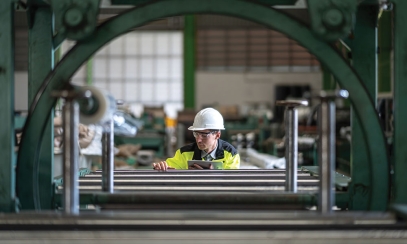Vocations Part 3: Ordained to Serve - A Deacon's Call Meet Dcn. Dave Barrett
Who Are You Called to Be? Your Vocation is a Gift From God to Us All.
Who Are You Called to Be? Your Vocation is a Gift From God to Us All.
A series on Vocations By: Deacon Dave Barrett, Fr. Matt Fedewa and Elizabeth Solsburg, Editorial Director for FAITH Magazine.
A series on Vocations By: Deacon Dave Barrett, Fr. Matt Fedewa and Elizabeth Solsburg, Editorial Director for FAITH Magazine.
What a wonderful ride it’s been, these 24 years! What a fulfilling and joyful time for this convert to the faith who had the audacity, three decades ago, to believe that God was calling him to holy orders – to the diaconate. Now, at age 75, from the vantage point of ‘senior’ status, I look back with an overwhelming gratitude for the priceless gift God has given me.
In the late 1970s, surely at the nagging of the Holy Spirit, I became convinced that a more serious commitment to my church and my God was called for. My wife, Jan, and I had been active in parish affairs in a number of roles, but it just was not enough. With her enthusiastic support, and the approval of our four teenaged children, I applied for the diocese’s new formation program for permanent deacons. The sacrament of holy orders for our class of 11 was conferred in June 1981.
Until Jan and I decided to take an early retirement five years later, I was employed in public school administration. Diaconal service had been limited to evenings and weekends – teaching our parish inquiry class, serving at Sunday Mass, and officiating at baptisms and an occasional wedding. Retirement at 57 opened the way to something closer to full-time diaconal service.
The inquiry classes evolved into the Rite of Christian Initiation of Adults, a year-round process of catechesis and Scripture sharing after the dismissal from Sunday Mass. Jan and I both had parents living in nursing homes. That led to service as an ombudsman for residents in long-term care facilities, a ministry I still cherish. Of course, presiding at the weddings of our four children and baptizing eight grandchildren were extra-special moments. It’s hard to say whether my years as a deacon are typical.
The word ‘deacon’ has it roots in diakonia, the Greek word for service. We are to minister especially to the poorest and least powerful among us. We are called, not to the priesthood, but to service. So, in addition to those liturgical responsibilities all deacons have in common, you’ll find us in prisons and jails; shelters for the homeless and abused; soup kitchens; migrant camps; as advocates for justice, adequate housing and health care; and engaged in the protection of human dignity.
The deacon’s mission can be summarized in the words of the Second Vatican Council, “God destined the earth and all it contains for ... all peoples so that all created things would be shared fairly by all ... under the guidance of justice tempered by charity.” (Gaudium et Spes, 69)
Yes, it’s been a wonderful ride. And while it’s true that God will never be outdone in generosity, in some small way I hope to have honored the Lord Jesus’ admonition to his disciples, “Without cost you have received; without cost you are to give.” (Matt.10:8b)
– Dave Barrett
Discernment – A story of a call answered
Mark’s college major was restaurant management. Anxious to use his knowledge, he opened a restaurant. The enterprise failed. An aunt, who was a real-estate agent living in another city, invited him to join her in the real estate business.
Dave BarrettMark knew he was a good salesperson, so he accepted his aunt’s invitation and moved. He began selling real estate. But when the pastor at his new parish asked for more choir members, Mark joined the choir. Later, when the pastor asked for help with the youth ministry, Mark volunteered. So it went until one day his aunt said, “Mark, either you sell real estate or you work for the church; it seems you can’t do both.” It was then he became aware once again of something he had experienced before in his life – a sense that he was called to be a priest.
There are three distinct aspects to a church vocation:
1) who the Lord calls us to be
2) how the Lord calls us to become ourselves in God (spirituality)
3) what the Lord calls us to do for God and for others (ministry)
(Vocations Anonymous, Sister Kathleen Bryant, RSC)
– Fr. Matt Fedewa
Permanent diaconate
In the early church, the apostles realized there was too much work for 12. In order for them to continue their charism of preaching the Gospel, they needed help caring for the poor and widows, and distributing food. They needed deacons. Deacons, from the Greek word diakonia, or “to be of service,” were called to do the practical work of the church. They assisted the bishop and elders.
Until the fourth century, the office of deacon was a vibrant part of church ministry. Ignatius of Antioch wrote, “Take care to do all things in harmony with God, with the bishop presiding in the place of God and with the presbyters in the place of the council of the apostles, and with the deacons, who are most dear to me, entrusted with the business of Jesus Christ, who was with the Father from the beginning and is at last made manifest.” (Letter to the Magnesians, 2)
As the church grew rapidly, the office of deacon became a transition on the way to the priesthood. At Vatican II, however, the office of the permanent deacon was restored. Deacons receive holy orders and fulfill a variety of liturgical roles, but are not “substitute priests.” They are ordained for a different kind of ministry, that of service to those in need. A deacon is called, in his ministry and in his life, to be a sacramental sign of Christ the servant.
The permanent diaconate is open to married men with families, and the church recognizes that the married deacon’s primary responsibility is to his family. In fact, married candidates to the diaconate require the written consent of their wives. However, once ordained, an unmarried deacon may not marry and a widowed deacon may not remarry without episcopal dispensation.
Deacons fulfill a special niche in the ministry of the church: They work collaboratively with bishops, priests, lay ministers and those in consecrated life to build the kingdom of God.
– Elizabeth Solsburg



